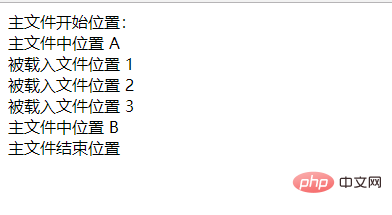Home >Backend Development >PHP Problem >There are several ways to reference files in php
There are several ways to reference files in php
- 青灯夜游Original
- 2021-05-12 17:50:366821browse
There are 4 ways for php to reference files: 1. Use the include() function, which can be placed anywhere in the PHP script; 2. require() function, usually placed at the front of the PHP script; 3. include_once () function; 4. require_once() function.

The operating environment of this tutorial: windows7 system, PHP7.1 version, DELL G3 computer
There are four statements for loading files in PHP: include, require, include_once, require_once.
Basic syntax
require: The require function is generally placed at the front of the PHP script. The require specification will be read in before PHP is executed. file that contains and attempts to execute the imported script file. The way require works is to improve the execution efficiency of PHP. After it is interpreted once in the same web page, it will not be interpreted the second time. But similarly, because it will not repeatedly interpret the imported file, you need to use include when using loops or conditional statements to introduce files in PHP.
include: can be placed anywhere in the PHP script, usually in the processing part of the process control. When the PHP script is executed to the file specified by include, it will be included and attempted to execute. This method can simplify the process of program execution. When encountering the same file for the second time, PHP will still re-interpret it again. The execution efficiency of include is much lower than that of require. At the same time, when the user-defined function is included in the imported file, PHP will have the problem of repeated function definition during the interpretation process. .
require_once/include_once: The functions are the same as require/include respectively. The difference is that when they are executed, they will first check whether the target content has been imported before. If it has been imported, Then the same content will not be reintroduced again.
The difference between each other
include and require:
include has a return value, while require has no return value
include is loading the file On failure, a warning (E_WARNING) is generated and the script continues execution after the error occurs. So include is used when you want to continue execution and output results to the user.
//test1.php
<?php
include './tsest.php';
echo 'this is test1';
?>
//test2.php
<?php
echo 'this is test2\n';
function test() {
echo 'this is test\n';
}
?>
//结果:
this is test1
require will generate a fatal error (E_COMPILE_ERROR) when loading fails, and the script will stop executing after the error occurs. Generally used when subsequent code depends on the loaded file.
//test1.php
<?php
require './tsest.php';
echo 'this is test1';
?>
//test2.php
<?php
echo 'this is test2\n';
function test() {
echo 'this is test\n';
}
?>Result:
include and include_once:
The files loaded by include will not be judged as to whether they are duplicates. As long as there is an include statement, they will be loaded once (even if duplicate loading may occur). When include_once loads a file, there will be an internal judgment mechanism to determine whether the previous code has been loaded. What needs to be noted here is that include_once is judged based on whether a file with the same path has been previously imported, rather than based on the content of the file (that is, the content of the two files to be imported is the same, and using include_once will still introduce two).//test1.php <?php include './test2.php'; echo 'this is test1'; include './test2.php'; ?> //test2.php <?php echo 'this is test2'; ?> //结果: this is test2this is test1this is test2 //test1.php <?php include './test2.php'; echo 'this is test1'; include_once './test2.php'; ?> //test2.php <?php echo 'this is test2'; ?> //结果: this is test2this is test1 //test1.php <?php include_once './test2.php'; echo 'this is test1'; include './test2.php'; ?> //test2.php <?php echo 'this is test2'; ?> //结果: this is test2this is test1this is test2 //test1.php <?php include_once './test2.php'; echo 'this is test1'; include_once './test2.php'; ?> //test2.php <?php echo 'this is test2'; ?> //结果: this is test2this is test1
require and require_once: The same difference as include and include_once.
Execution process when loading1. Exit php script mode from the include (require) statement (enter html code mode)2. Load the settings set by the include statement The code in the file and try to execute3. Exit the html mode, re-enter the php script mode, and continue the execution of the subsequent script program//test1.php 主文件开始位置: <?php echo "<br> 主文件中位置 A"; include "./test2.php"; //要载入的文件 echo "<br> 主文件中位置 B"; ?> <br> 主文件结束位置 //test2.php <br> 被载入文件位置 1 <?php echo "<br> 被载入文件位置 2"; ?> <br> 被载入文件位置 3
Result analysis:
Comparison of return values
The above is the detailed content of There are several ways to reference files in php. For more information, please follow other related articles on the PHP Chinese website!




